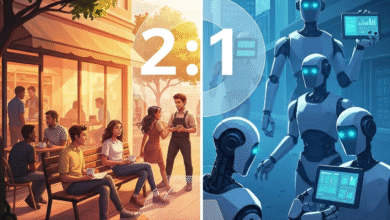The AI Mistake Tesla Already Made With Robots

▼ Summary
– 82% of people prefer human customer service representatives over AI, even when wait times are identical.
– Overreliance on AI in customer service can lead to reputational damage due to errors and customer frustration.
– Some companies like McDonald’s and Klarna are reversing AI implementations after experiencing quality issues.
– Research shows only a small fraction of business AI initiatives have delivered expected returns on investment.
– Businesses are realizing that AI cannot fully replicate the human touch, making human interaction still valuable.
The growing trend of businesses replacing human customer service agents with artificial intelligence systems may be a costly misstep, according to recent industry analysis. While AI promises efficiency and cost savings, new evidence suggests that overreliance on automated systems risks alienating customers and damaging brand reputation. This pattern echoes previous technological overcorrections, including Tesla’s admission that excessive automation hampered production.
Most consumers still strongly prefer human interaction when seeking customer support. Research from HubSpot and SurveyMonkey reveals that 82% of respondents favor speaking with human representatives, even when wait times match those of chatbot interactions. Verizon’s parallel research reinforces this preference, showing 88% satisfaction with human agents compared to just 60% satisfaction with AI-powered systems.
The financial implications of customer dissatisfaction are becoming increasingly apparent. Shai Ahrony, CEO of marketing agency Reboot Online, describes an “AI aftershock” affecting companies that hastily implemented automated systems. “Organizations that rushed to eliminate positions in pursuit of AI savings now confront substantial, often unanticipated expenses,” he explains. Customers frequently share examples of AI-generated errors across social media platforms, from chatbots providing incorrect answers to marketing communications that misrepresent brands.
This backlash has tangible business consequences. “Some consumers post negative reviews and warnings on platforms like X, TikTok and Reddit, advising others to avoid companies that deploy AI excessively,” Ahrony notes. “This type of reputational harm carries significant financial costs.”
Several prominent companies have already reversed course after experiencing AI’s limitations firsthand. McDonald’s discontinued an automated order-taking system developed with IBM after the technology’s mistakes gained viral attention online. Financial technology firm Klarna recently resumed hiring human customer service staff after determining that AI delivered inferior service quality, despite having reduced its workforce by approximately 40% through automation.
Broader industry data supports these cautionary examples. An IBM survey of 2,000 CEOs found only about 25% of internal AI initiatives delivered expected returns on investment. More strikingly, MIT research published in August indicated that 95% of corporate AI experiments failed to generate measurable financial returns.
This pattern of technological overreach has historical precedent. In 2018, Tesla CEO Elon Musk publicly acknowledged that the company’s dependence on “excessive automation” had been an error when production targets for the Model 3 went unmet. His subsequent observation that “humans are underrated” resonates with current customer service challenges.
Companies aggressively implementing AI customer service solutions may reach similar conclusions. Although the technology can reduce expenses and improve efficiency in certain applications, it cannot fully replicate human judgment, empathy, and problem-solving capabilities. For the foreseeable future, AI’s limitations in customer-facing roles may outweigh its potential benefits, suggesting that the most effective approach combines technological tools with human oversight.
(Source: ZDNET)





